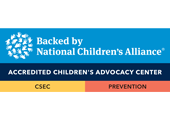Parents + Caregivers
How to Protect Your Child
There’s no perfect age for speaking with your children about body safety. Instead, it should be part of an ongoing dialogue from their early years through their teens. Engage your children, talk with them about their bodies, show that you’re available to answer questions, and always create an atmosphere of trust. The following tips are not meant to be a complete answer, but are some general guidelines for speaking with your child.
Do’s
To help reduce the risk of your child being exploited, here are some suggestions
- Talk about which parts of their bodies are considered “private” and which are not private, using whatever terms are common within in your home.
- Talk with your child at a quiet time, without distractions, so that you have their attention. Remember the importance of the subject, but be yourself.
- Talk about who CAN touch your child’s private parts, such as a doctor as part of an exam or parents and caregivers who might assist with toileting or bathing. Distinguish between those normal activities and inappropriate touches.
- Talk about how it is not okay for anyone else to touch their private parts, including other children.
- Talk about what your child should do if someone touches them, who they should tell, and where they can go. Make sure they know they can always talk to you, no matter what has happened.
- Emphasize that it’s never safe to go into another person’s home or car without your knowledge. Make it clear this includes neighbors, friends, family members and acquaintances.
- Let them know that they should not let other adults into your home, even if they have seen them before, if you are not home.
- Become familiar with the Signs and Symptoms of Abuse such as changes in behavior or sleeping habits.
- Show support for whatever your child tells you. Try not to show that you’re upset as their truthful disclosure and emotional recovery depend on your love and support.
Don’ts
If you suspect your child has been abused, there are some suggestions we ask you do not do.
- Do not ask direct questions, such as “Has Uncle Bob ever touched you?” Inquire in general about different people that your child is in contact with.
- Do not use dolls or stuffed animals to demonstrate. This can invite “magical thinking” into the scenario as children commonly engage in pretend play with these toys.
- Do not expect anyone else to educate your child on the subject of body safety and sexual abuse.
- Do not ask your child why they waited so long to tell if they disclose, or why they didn’t tell you first. It took a lot of courage for your child to come forward.
- Do not confront an abuser in front of your child, but do assure them that you are going to get help and will be addressed by an adult.
If your child does disclose something of concern, or you suspect abuse, avoid the temptation to ask direct or leading questions. Instead, click here to know what the next steps should be.







